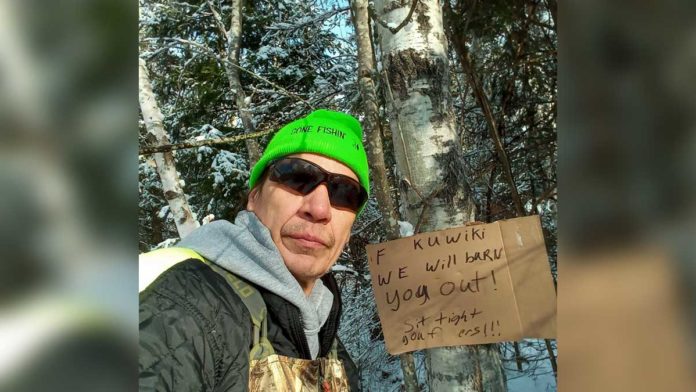
Point Grondine cabin threatened with arson
POINTE GRONDINE—Stitch Manitowabi is a big proponent of living off the land and following a more traditional diet and as a resources coordinator with Wiikwemkoong Lands, he has introduced turkeys to Wiikwemkoong territories and held several workshops on the preparation of wild game. Mr. Manitowabi was shocked to discover threatening signs posted around his Pointe Grondine property during a December 23 visit.
“I already knew about the signs,” said Mr. Manitowabi, explaining that a friend had sent him photos of the signs. “They sent them to me as I was going to Killarney the next day. It was quite the calling card for the 12 Days of Christmas.”
The signs containing threats and profane language were posted about two kilometres up Halifax Road in the Killarney area.
Mr. Manitowabi said that he sees the signs as a hate crime, a conclusion that appears to be shared by the Ontario Provincial Police, who told him they are investigating the signs as such. He had originally gone to the Wiikwemkoong Tribal Police Service (WTPS), but since the signs were located outside their jurisdiction, he did not file a complaint with WTPS and turned to the OPP which took his information and is investigating the incident.
Mr. Manitowabi has had several incidents of harassment at his hunting camp. “They stole my beds and wrote graffiti all over the walls,” he said. “I mean, who steals beds?” He believes the signs and other actions are aimed at the high number of hunters who access the area along that road, but it is clear from the signs that the anger is primarily aimed at people from the community of Wiikwemkoong, who are specifically identified in the signs.
Killarney Mayor Michael Reider visited the area where the signs were posted and said that he had also met with several residents of Wiikwemkoong. “I didn’t have the feeling that this was a non-aboriginal and aboriginal issue,” he said. “What I understand is that it is an issue between two aboriginal groups who are having a disagreement among themselves about hunting rights and limits of animals taken.”
Mayor Reider said he found out about the signs on Halifax Road off Highway 637, the road into Killarney from MCTV News. “I knew absolutely nothing about it until I received a call from an MCTV reporter.”
“So, I went out there to talk to people in the area and got what I thought was the story from people on both sides of the issue,” said Mayor Reider. “It appears to be a fight between two groups of aboriginal people, one group that says the hunting that is being carried out is ruining the area by taking too many animals and the other group saying they have the right to hunt.”
“It appears to be an old issue among two aboriginal groups, who are having a disagreement among themselves on limits on animals taken, aboriginal history and customs for hunting,” asserted Mayor Reider. “It has nothing to do with the Town of Killarney and it doesn’t appear to be an aboriginal and non-aboriginal issue. It has nothing to do with that. That is the feeling I get.”
Mr. Manitowabi points out that this is not the first time there have been incidents he believes were aimed at Indigenous hunters. “About eight years ago there were similar reactions,” he said. He noted that while there have been discussions between a neighbouring reserve where hunters also access the area, he feels those concerns have been largely laid to rest.
Mr. Manitowabi said that he feels the issue really stems from a lack of understanding of Indigenous treaty rights. “I believe education is the solution,” he said, noting that even among Indigenous peoples who have treaty rights to hunt, there is a lot of misunderstanding of what that means.
But the threats and anger exhibited on the signs, many of which specifically cite Wiikwemkoong, are not strictly aimed at hunting.
“We did harvest birchbark from the area,” said Mr. Manitowabi, “but that didn’t kill any trees.” One of the signs was posted on a tree that had some outer layers of birchbark taken off claimed, following a profane epitaph, that “everything is dead.”
The chilling effect has spread a long way.
Researchers from the University of Guelph who are studying wolf populations in the region in collaboration with Wiikwemkoong contacted Mr. Manitowabi asking if it was safe to resume the study.
For his part, Mr. Manitowabi said he does not believe the signs reflect the general attitude among residents of Killarney. “I am always greeted pleasantly in Killarney,” he said. Mr. Manitowabi said he hopes better education and communication will provide a solution.
“We have a long time to live here together so we need to have a respectful relationship,” he said, “without threats and intimidation like this. To me, these are hate crimes, it is hard to see them any other way.”
Mr. Manitowabi noted that the area has attracted youth groups from southern urban reserves who come to experience and connect with the land.
Wikwemikong Tribal Police Service issued a release on the matter, noting that while they “have not received a complaint with regards to this type of messaging. Since receiving this information, WTPS has been investigating and would like to reach out to the public for assistance in identifying any suspect(s) who may be responsible for these despicable hate motivated offences. Anyone with information is asked to contact WTPS at 705-859-3141. Tips may be provided anonymously by calling crime stoppers at 1-800-222-TIPS.”





